EN

Novembro 2025
You may have seen her in the bottom right corner of your screen. Born in Massarelos, Porto, Cláudia often appears on RTP newscasts, but never in the centre of the frame. On television, in classrooms, in theatres and in other contexts, this LGP interpreter's hands draw in the air what sound cannot “say”.
When Cláudia finished 12th grade, she dreamed of becoming a speech therapist, but she was unable to enrol in higher education right away. So she signed up for a volunteer programme run by the Portuguese Youth Institute at the Araújo Porto Institute, where ‘deaf children attended primary school’. ‘I was with the kids in class, during breaks, and I started learning sign language with them.’
After this volunteer work, which lasted about two years, Cláudia graduated with a degree in Psychopedagogy. ‘I didn't take the LGP Translation and Interpreting course straight away because I liked helping people with learning difficulties, which is also a characteristic of some deaf people,’ she says. Later, when she finished her degree, she enrolled at the Escola Superior de Educação (ESE) in Porto ‘because I really wanted to be a sign language interpreter’. After completing her degree, Cláudia taught future LGP interpreters at ESE and, four years later, began working in schools with deaf students. Today, she works as an interpreter for deaf students at the Dr. João de Araújo Correia School Group in Peso da Régua.
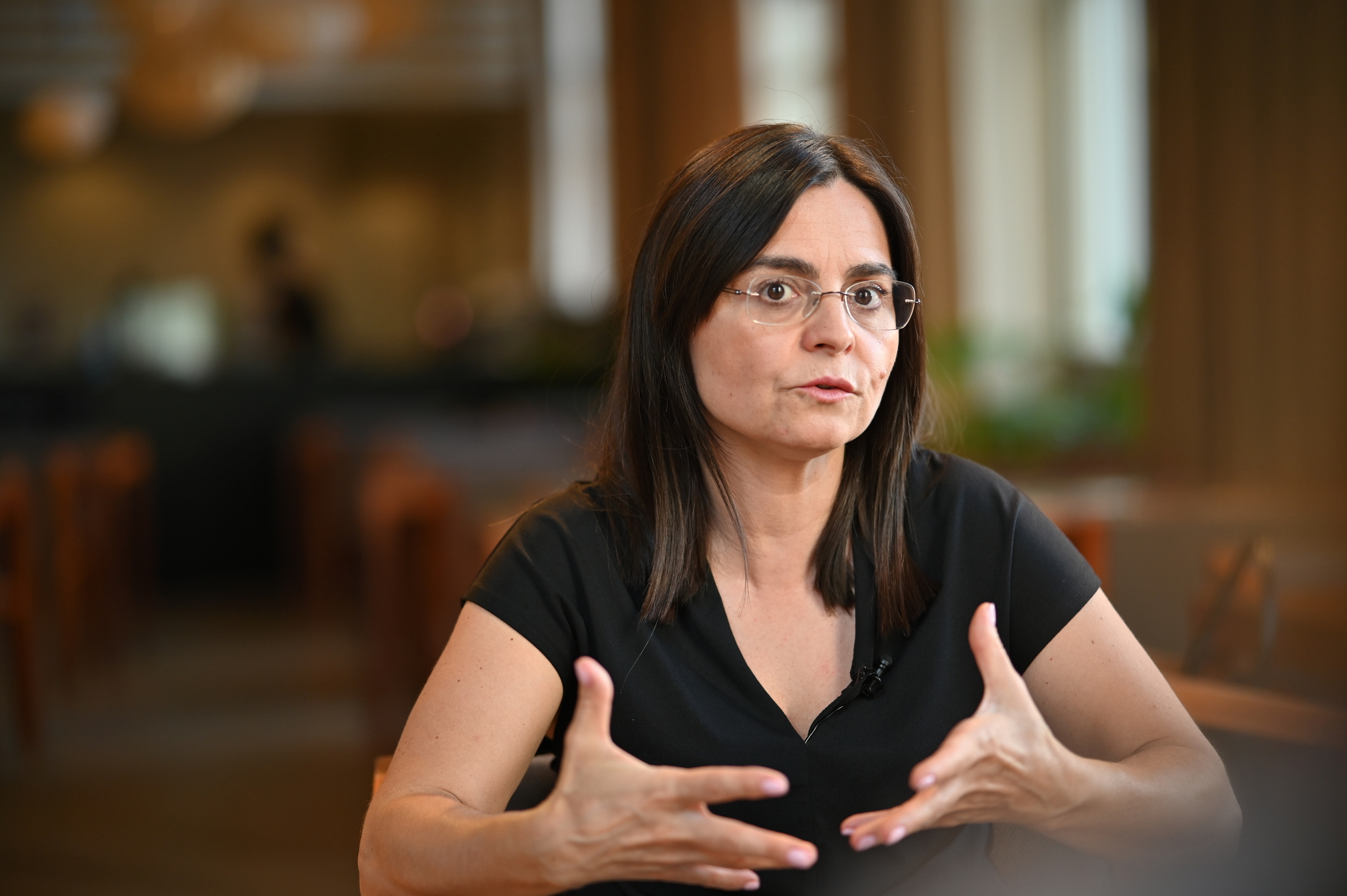
Cláudia Rubim © Rui Meireles
“LGP is talking with your hands and body. Everything is communication.”
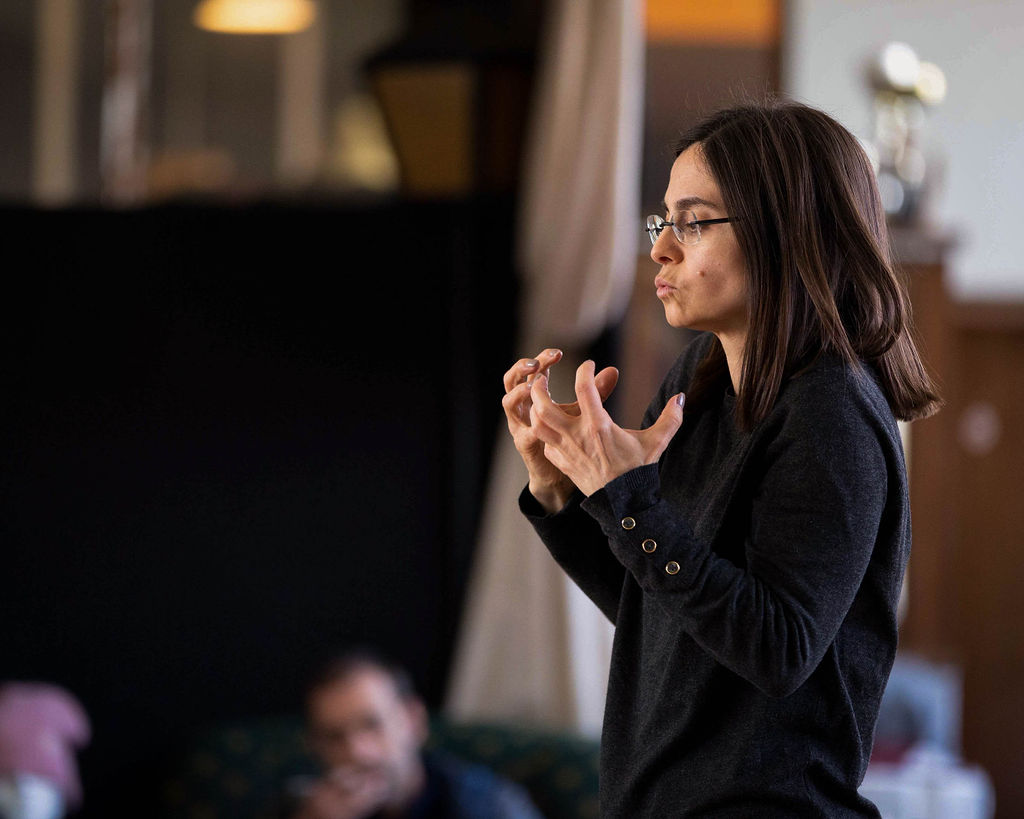
© Teresa Oliveira
“It is important to distinguish between LGP interpreters and teachers. I am currently working as an interpreter in Régua. I do not teach the language, and those who teach it do not translate. In an educational context, these roles are sometimes confused; they complement each other, but they are different,” she explains.
“Since 2008, there have been so-called reference schools in the country which, if parents so wish, provide bilingual education to deaf students,” explains Cláudia. “Students learn sign language in a school context with teachers, because most deaf people are born into hearing families, and their parents do not master LGP; therefore, they have the opportunity to learn sign language from an early age, starting in preschool.”
Interpreters usually accompany deaf students from the 5th to the 12th grade. ‘This is when the student already has a greater command of the language, which can only be acquired through interaction with classmates and learning in a school context. From then on, we are able to translate a lesson; so I am in a classroom next to a teacher, in front of deaf students, and I am constantly mediating communication,’ she explains.
It was on 15th November of 1997 that LGP was recognised by the Constitution of the Portuguese Republic. According to the interpreter, ‘the struggle of deaf people for this recognition also helped their profession to gain greater importance’, emphasising that ‘it is a means of access and equal opportunities for the deaf community’.
Cláudia believes that it was during the COVID-19 pandemic that the role of the LGP interpreter began to be ‘more prominent,’ particularly at press conferences held by the Ministry of Health. "I still remember being at home and deaf friends calling me on video chat asking me to call the Health Line 24 to mediate with the nurse, because at the time no one even thought about deaf people. From then on, SNS 24 always had a sign language interpreter available to mediate, and deaf people could call via video call," she says, satisfied.
Sign language is not universal
Contrary to what many hearing people still believe, sign language is not universal; each country has its own sign language. "A language is associated with a culture. I am Portuguese, I speak Portuguese. I am an LGP interpreter because the deaf community I work for is the deaf community in Portugal." Incidentally, Cláudia points to SpreadTheSign, available online, where you can compare the sign languages of different countries.
There are also regionalisms in LGP
When questioned by Agenda Porto, Cláudia confirms that there are regionalisms in LGP. ‘It is more noticeable between the north and the south, just as we say “café” or “bica”.’ The interpreter gives the example of the difference in the sign for the word ‘volunteer’ in Porto and Lisbon [see the video below]. ‘It's also a challenge for us as interpreters, because to translate for a deaf person from Lisbon, I have to know that gesture, but I think these differences are what make LGP even richer. Besides being beautiful, because the hands and body can convey everything,’ she emphasises.
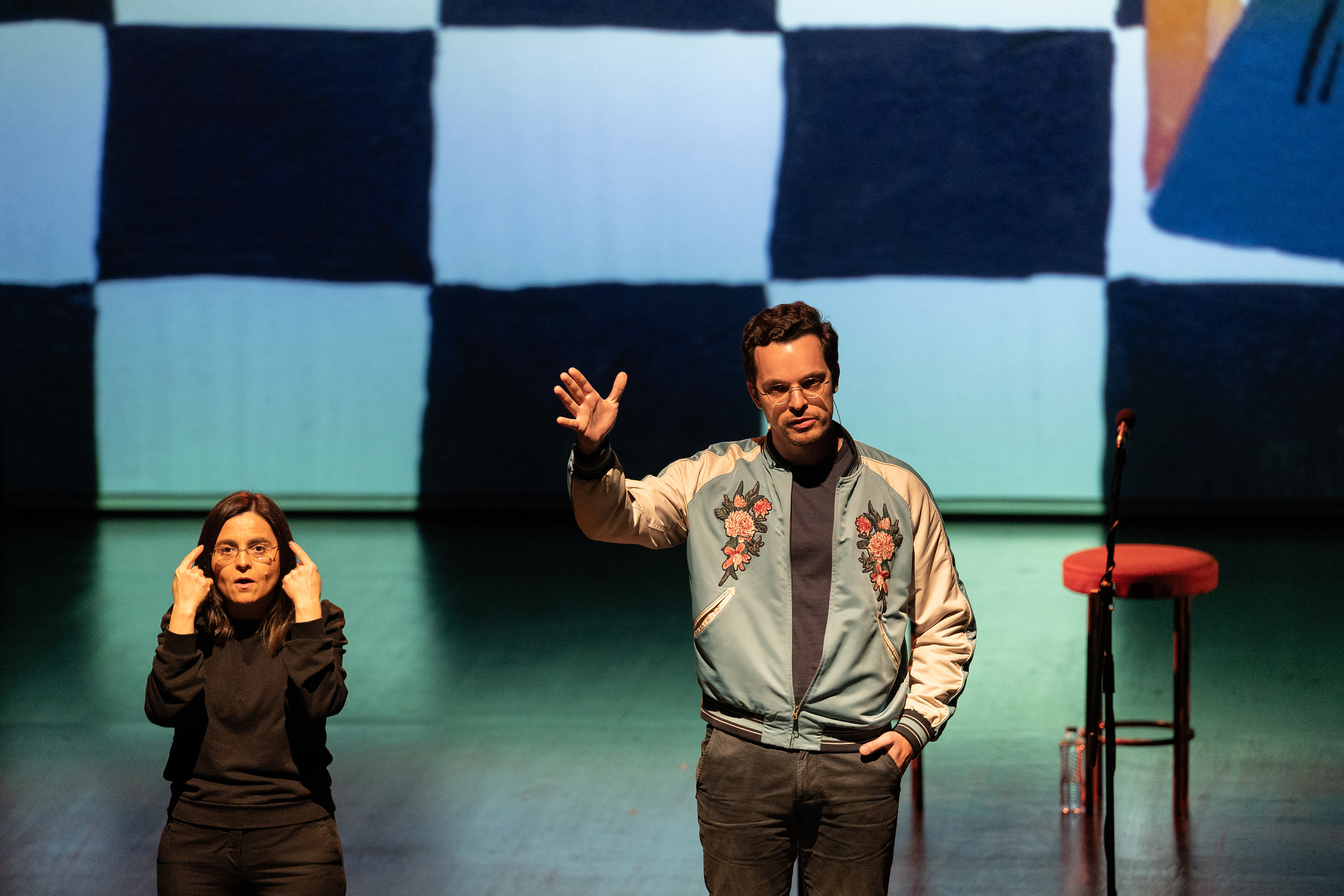
Cláudia Rubim nas Quintas de Leitura © João Octávio Peixoto /TMP
Giving stage to inclusion
More and more artistic companies and theatres have been adopting inclusive practices, such as LGP translation and interpretation services. ‘I feel that not only on television but also in theatre and musical performances, people are starting to think more about the deaf community, which is beginning to participate more in events because they realise that there is something that can help them understand the message,’ says Cláudia, who has taken on the role of translator and interpreter in various cultural events in the city, such as Quintas de Leitura.
However, despite improvements in accessibility to cultural enjoyment, there is still a long way to go. ‘Our position on stage is not always the best; this also needs to be worked on because, perhaps, we interpreters should be involved in the design of the play from the outset so that we understand what space we should occupy; it's not just a matter of saying that the interpreter is in the corner, or, as has happened to me, putting me under the stage,’ says Cláudia. And she adds: ‘I don't know if we can consider this true inclusion, because deaf people have to divide their attention, and if they are looking at the corner where the interpreter is, they are missing some of the action, some movement, some scenes.’ In these situations, despite the presence of a sign language interpreter, ‘true inclusion and true accessibility are questionable.’
In contrast, she has participated in shows ‘where he is in the middle, alongside the characters, and for deaf people it is much easier, because there is less visual distraction.’ And, by the way, she evokes the ‘fantastic work’ of Marco Paiva's Terra Amarela company, ‘which does something that other theatres should do: include deaf actors in their shows’. ‘That makes all the difference, even in attracting deaf audiences to the shows.’
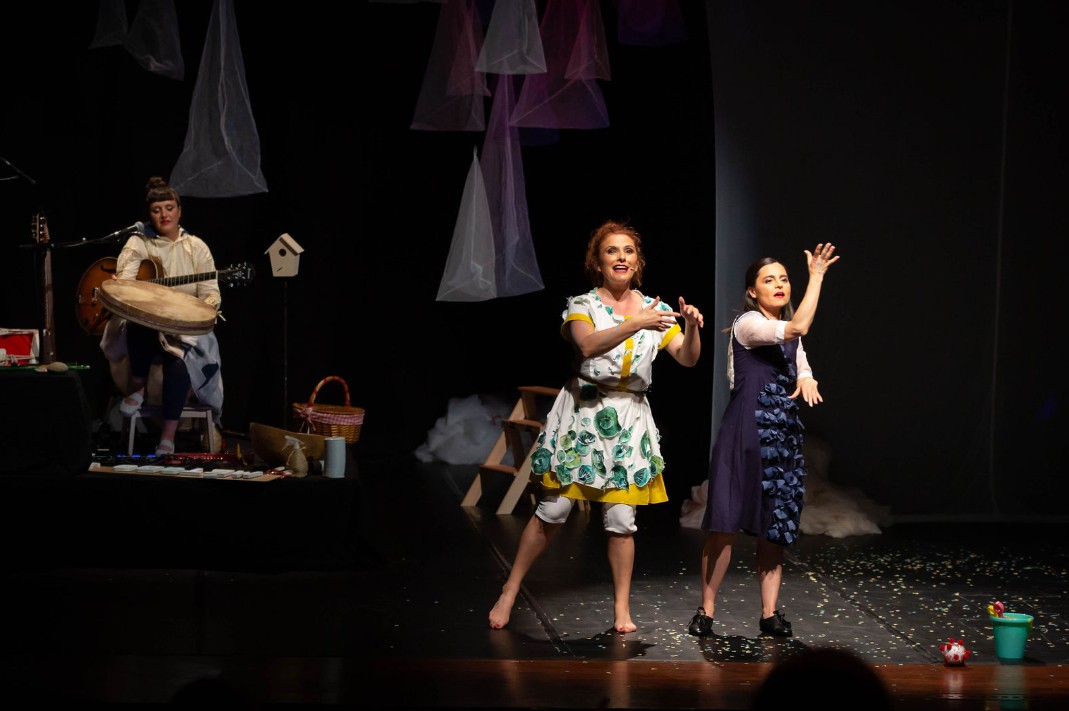
Cláudia Rubim no espetáculo "O Poema só existe no espaço onde há Luz", d'O Som do Algodão, 2022 © Teresa Oliveira
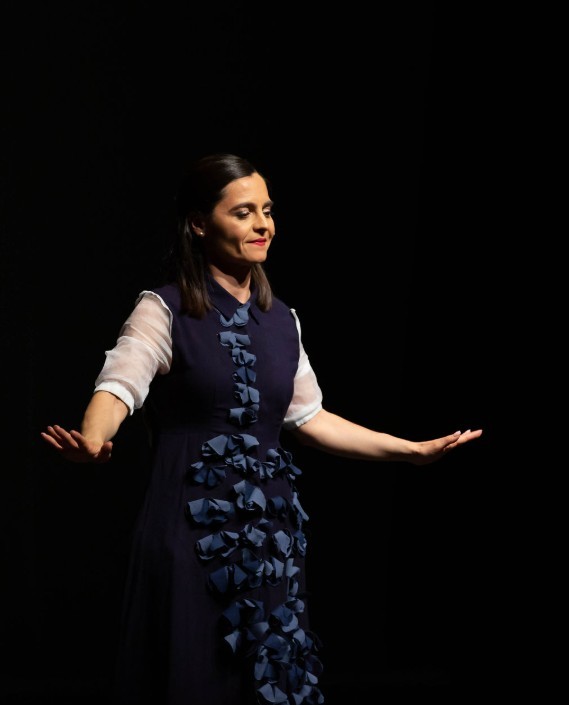
Cláudia Rubim no espetáculo "O Poema só existe no espaço onde há Luz", 2022 © Teresa Oliveira
As an interpreter, Cláudia enters a silent world, transforming sounds into gestures and translating not only what is said, but what is felt. To do this job, she says, you need ‘a lot of preparation beforehand, at home’. "When it's a theatre show, for example, we are given the script in advance and we have to prepare it, digest that language. And we have to make an effort to convey the actors' feelings, to convey the sensations – and it's not just the gestures that count; it's our body language, our facial expressions."
LGP interpreters end up having room for creativity and personal expression in artistic contexts. ‘It has happened to me here in Porto that the actor came to get me and included me in the play. I wasn't expecting it, but I felt that I also had to improvise at that moment, to leave a little bit of myself there.’
One of her most memorable moments as an interpreter in cultural events was the New Year's Eve concert, organised by the municipality on Avenida dos Aliados, where she had "the privilege" of interpreting for Rui Veloso in front of a crowded square. ‘It was a big challenge and I really enjoyed it.’
The interpreter also stresses that ‘all plays are always a challenge.’ ‘Especially when they are by great playwrights, who also require a lot of research on our part to understand the best gesture to translate that expression, that feeling, that word.’
And, by the way, she points out that in LGP there are not gestures for all words. ‘When I'm on television translating, people sometimes tell me that I “took a little longer”, but as there aren't gestures for all words, at that moment, in a fraction of a second, I have to use several gestures to explain a concept,’ she says, giving the word ‘euthanasia’ as an example.
“Even in shows, I have to do this preparation beforehand, because if I don't have a gesture for a particular word, I have to come up with a series of gestures, or change the context, to get the message across as accurately as possible.”
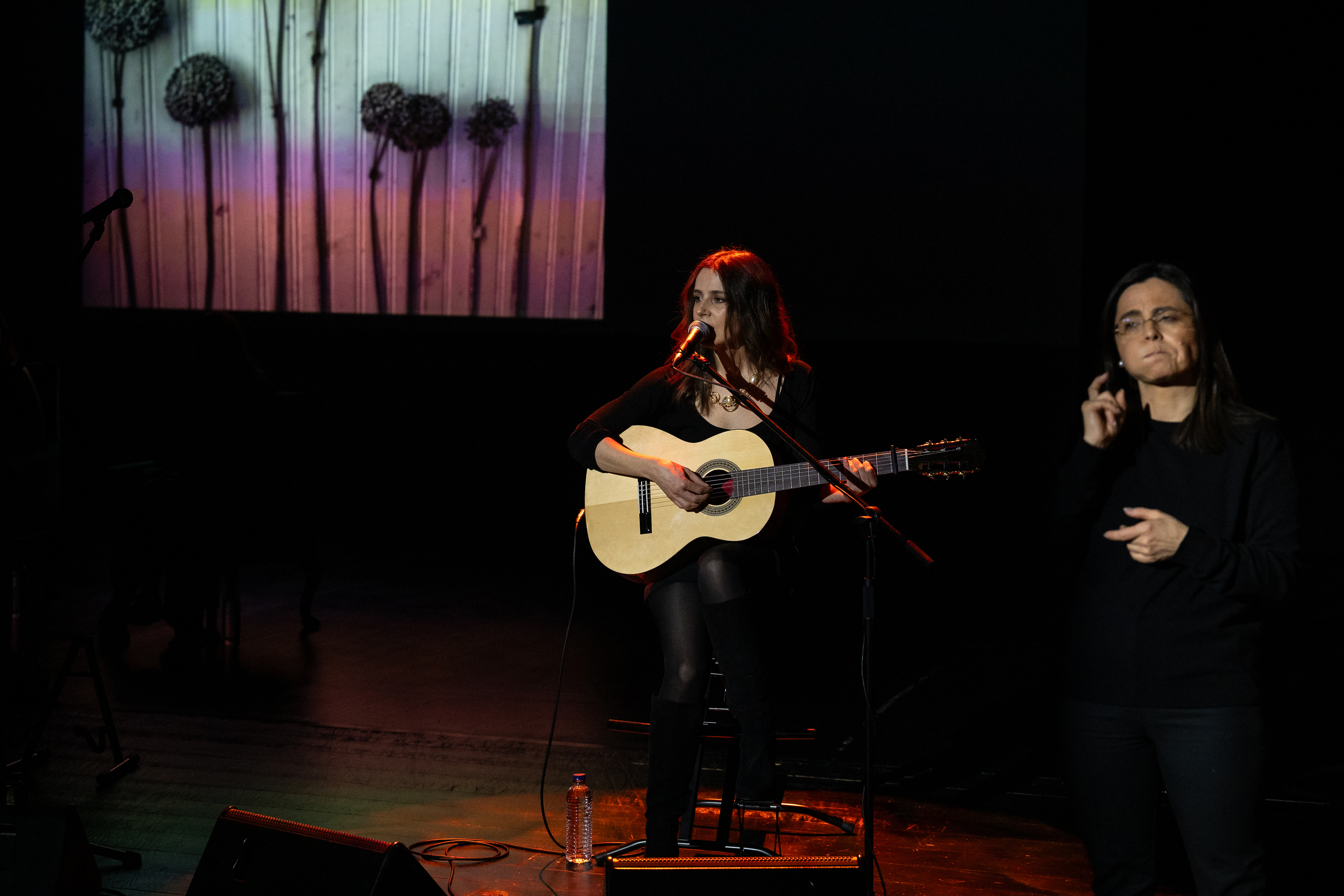
Cláudia Rubim nas Quintas de Leitura © João Octávio Peixoto /TMP
Regarding the future of LGP, the interpreter argues that ‘more people should learn it.’ ‘We should all know a little bit of LGP, especially in leading schools, because in a school where deaf people learn alongside hearing people, you should have LGP as an optional subject, just like you have English, French or Spanish,’ she maintains. In this regard, she points out that some schools in the country, such as in Viseu, offer LGP as an optional subject for hearing students. For Cláudia, there is still a lack of ‘accessibility and more work with the deaf community itself’.
Did you know?...
It is wrong to say ‘deaf-mute’: ‘the word “mute” was used to characterise deaf people as “incapable”. 'At present, the “problem” for deaf people is that they communicate differently; they use a form of manual expression and a form of visual communication. Therefore, it is insulting to use this term.’
Share
FB
X
WA
LINK
Relacionados


